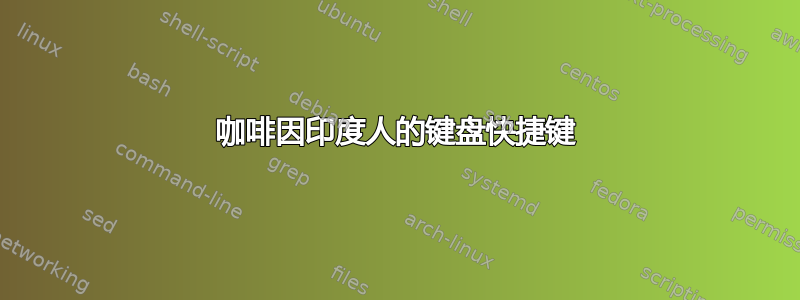
有什么方法可以设置键盘快捷键吗caffeine-indicator?或者我可以从终端运行的命令。我正在使用 Ubuntu 16.04 LTS。Caffeine Indicator v2.8.3。
答案1
我知道这是一个非常老的问题,但也许这会对某些人有所帮助。
事实证明,caffeine-indicator 只是一个位于 /usr/bin/caffeine-indicator 的 python 脚本。我编辑了该脚本以允许切换键盘快捷键。当前设置为 ctrl + t,但您可以通过更改代码中的快捷键字符串将其编辑为任何您想要的。请注意,特殊键必须用 <> 括起来,而普通键(如 t)则不能。这是编辑后的脚本:
#!/usr/bin/python3
#
# Copyright © 2009-2020 The Caffeine Developers
#
# This program is free software: you can redistribute it and/or modify
# it under the terms of the GNU General Public License as published by
# the Free Software Foundation, either version 3 of the License, or
# (at your option) any later version.
#
# This program is distributed in the hope that it will be useful,
# but WITHOUT ANY WARRANTY; without even the implied warranty of
# MERCHANTABILITY or FITNESS FOR A PARTICULAR PURPOSE. See the
# GNU General Public License for more details.
#
# You should have received a copy of the GNU General Public License
# along with this program. If not, see <http://www.gnu.org/licenses/>.
import os
import sys
from os.path import join, abspath, dirname, pardir, exists
import gettext
import locale
import logging
import argparse
import signal
import builtins
from subprocess import call
from pynput.keyboard import Key,HotKey,GlobalHotKeys
import threading
import pkg_resources
import gi
gi.require_version('Gtk', '3.0')
gi.require_version('AyatanaAppIndicator3', '0.1')
from gi.repository import GLib, Gtk, GObject, AyatanaAppIndicator3 as AppIndicator3
from Xlib import display
PROGRAM_NAME = "caffeine-indicator"
VERSION = pkg_resources.require("caffeine")[0].version
run = True
# Register the gettext function for the whole interpreter as "_"
builtins._ = gettext.gettext
def get_base_path():
c = abspath(dirname(__file__))
while True:
if exists(join(c, "share", PROGRAM_NAME)):
return c
c = join(c, pardir)
if not exists(c):
raise Exception("Can't determine BASE_PATH")
BASE_PATH = get_base_path()
GLADE_PATH = join(BASE_PATH, 'share', PROGRAM_NAME, 'glade')
# Set up translations
LOCALE_PATH = join(BASE_PATH, "share", "locale")
locale.setlocale(locale.LC_ALL, '')
for module in locale, gettext:
module.bindtextdomain(PROGRAM_NAME, LOCALE_PATH)
module.textdomain(PROGRAM_NAME)
# Handle command line arguments
parser = argparse.ArgumentParser(prog=PROGRAM_NAME, description='Toggle desktop idleness inhibition')
parser.add_argument('-V', '--version', action='version', version=PROGRAM_NAME + ' ' + VERSION)
parser.parse_args()
class GUI(object):
def __init__(self, caffeine):
self.Caffeine = caffeine
self.Caffeine.connect("activation-toggled", self.on_activation_toggled)
self.labels = [_("Activate"), _("Deactivate")]
builder = Gtk.Builder()
builder.add_from_file(join(GLADE_PATH, "GUI.glade"))
get = builder.get_object
self.AppInd = AppIndicator3.Indicator.new("caffeine-cup-empty",
"caffeine",
AppIndicator3.IndicatorCategory.APPLICATION_STATUS)
self.AppInd.set_status(AppIndicator3.IndicatorStatus.ACTIVE)
self.activate_menuitem = get("activate_menuitem")
self.set_icon_is_activated(self.Caffeine.get_activated())
# Popup menu
self.menu = get("popup_menu")
self.menu.show()
self.AppInd.set_menu(self.menu)
# About dialog
self.about_dialog = get("aboutdialog")
self.about_dialog.set_version(VERSION)
self.about_dialog.set_translator_credits(_("translator-credits"))
# Activate menu item shortcut
self.AppInd.set_secondary_activate_target(self.activate_menuitem)
builder.connect_signals(self)
def on_activation_toggled(self, source, active, tooltip):
self.set_icon_is_activated(active)
def set_icon_is_activated(self, activated):
# Toggle the icon, indexing with a bool.
icon_name = ["caffeine-cup-empty", "caffeine-cup-full"][activated]
self.AppInd.set_icon_full(icon_name, "Caffeine is {}".format("activated" if activated else "deactivated"))
self.activate_menuitem.set_label(self.labels[self.Caffeine.get_activated()])
# Menu callbacks
def on_activate_menuitem_activate(self, menuitem, data=None):
self.Caffeine.toggle_activated()
menuitem.set_label(self.labels[self.Caffeine.get_activated()])
def on_about_menuitem_activate(self, menuitem, data=None):
self.about_dialog.set_position(Gtk.WindowPosition.CENTER_ALWAYS)
self.about_dialog.run()
self.about_dialog.hide()
def on_quit_menuitem_activate(self, menuitem, data=None):
# Make sure desktop idleness is uninhibited
global run
run = False
self.Caffeine.release()
Gtk.main_quit()
def make_unmapped_window(wm_name):
screen = display.Display().screen()
window = screen.root.create_window(0, 0, 1, 1, 0, screen.root_depth)
window.set_wm_name(wm_name)
window.set_wm_protocols([])
return window
class Caffeine(GObject.GObject):
def __init__(self):
GObject.GObject.__init__(self)
self.window = make_unmapped_window("Caffeine indicator")
self.status_string = None
self.screenSaverWindowID = None
def get_activated(self):
return self.screenSaverWindowID != None
def toggle_activated(self):
if self.screenSaverWindowID == None:
self.screenSaverWindowID = hex(self.window.id)
self.status_string = _(PROGRAM_NAME + " is inhibiting desktop idleness")
logging.info(self.status_string)
call(['xdg-screensaver', 'suspend', self.screenSaverWindowID])
else:
self.release()
self.emit("activation-toggled", self.get_activated(), self.status_string)
def release(self):
if self.screenSaverWindowID != None:
call(['xdg-screensaver', 'resume', self.screenSaverWindowID])
self.screenSaverWindowID = None
self.status_string = _(PROGRAM_NAME + " is inactive")
logging.info(self.status_string)
def start_listener():
# ctrl + t
with GlobalHotKeys({
"<ctrl>+t": on_release
}) as h:
while run:
h.join(0.1)
def on_release():
caffeine.toggle_activated()
# Adapted from http://stackoverflow.com/questions/26388088/python-gtk-signal-handler-not-working
def InitSignal(gui):
def signal_action(signal):
caffeine.release()
sys.exit(1)
def idle_handler(*args):
GLib.idle_add(signal_action, priority=GLib.PRIORITY_HIGH)
def handler(*args):
signal_action(args[0])
def install_glib_handler(sig):
# GLib.unix_signal_add was added in glib 2.36
GLib.unix_signal_add(GLib.PRIORITY_HIGH, sig, handler, sig)
for sig in [signal.SIGINT, signal.SIGTERM, signal.SIGHUP]:
signal.signal(sig, idle_handler)
GLib.idle_add(install_glib_handler, sig, priority=GLib.PRIORITY_HIGH)
# Set up and run
l_thread = threading.Thread(target=start_listener, daemon=True)
l_thread.start()
logging.basicConfig(level=logging.INFO)
GObject.signal_new("activation-toggled", Caffeine,
GObject.SignalFlags.RUN_FIRST, None, [bool, str])
caffeine = Caffeine()
gui = GUI(caffeine)
InitSignal(gui)
Gtk.main()
请注意,您必须安装 pynput。


